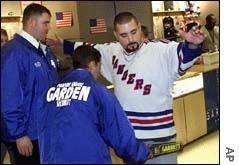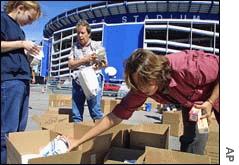|
Security is no game
|
 |
September 21, 2001: 3:20 p.m. ET
Terrorism threat could cost sports the whole game if more steps aren't taken
A weekly column by Staff Writer Chris Isidore
|
NEW YORK (CNNfn) - John Stefanelli had been a New York Giants season ticket holder from the opening of the club's stadium in New Jersey in 1976 until last Tuesday morning.
A director of sales for a financial services risk management firm, Stefanelli said he's gotten rid of his two tickets for the rest of the season. His father has gotten rid of four Giants and four Jets season tickets as well.
They just don't feel safe gathering in large crowds anymore in the wake of last week's attack across the Hudson River at the World Trade Center.

|
|
|
A fan is checked at a Rangers-Devils exhibition hockey game Wednesday night, the first sporting event held in New York since last week's terrorist attack. | |
"I don't think their terrorists are done," Stefanelli said. "They're going to make it a very public event. A Monday night football game, a big game everyone is watching and all of a sudden everyone will be dead.
"I have to keep working and I have to keep flying," he said. "I don't have to go to a Giants game."
He says he had no trouble finding takers for his tickets this year, and says he'll hang onto his tickets in case he feels differently next season. But he doesn't think he will.
An informal sampling of sports fans finds many saying they will continue to go to games, feeling they will be as safe or safer than in the past. And while most have expressed the feeling that sports are less important to them than they were before the attack, some add they find they need the diversion of sports now more than ever to get some distance from the tragedy.
"I watched my first entire baseball game of the season last night," said Mark Haefeli, a film/video producer/director who lives in a New York suburb. "It was very soothing."
The short-term problem for sports teams from the attack was canceling and rescheduling a few games.
The medium-term problem is how many John Stefanellis there are out there who will be more reluctant to buy tickets in the future. Postseason games and the most popular teams won't be hurt. But for sporting events that don't traditionally sell out, like most baseball games, anyone who doesn't go to a game due to security concerns represents lost revenue for the team that will not be recaptured.
| |

|
|
Shea Stadium was used as a staging area for supplies for rescue workers after last week's terrorist attack. But there will be relatively minor changes in security when games resume there Friday. | |
The long-term problem arises if Stefanelli is right about a sporting event being the terrorists' future target.
The security measures announced by U.S. sports leagues and teams in the wake of the attacks might assure some nervous fans, but they won't stop anyone committed to further terrorizing the public.
A ban on backpacks could discourage families with young children who find themselves carrying more items to games than a teenager on a European vacation. But would it stop a terrorist from smuggling very destructive weapons into a park?
No team has announced even the basic step of installing walk-through metal detectors for fans to pass through on their way into the park, although the New York Rangers hockey team used hand-held detectors at the city's first sporting event since the attack Wednesday night.
"I think we're trying to reassure fans we've made every step possible to make sure every ballpark is secure," said Pat Courtney, spokesman for Major League Baseball. "Using metal detectors, there's a thought it would instill almost a greater fear."
Other sports executives talk of cost or inconvenience for fans being a problem if metal detectors are used. But a top-of-line metal detector from Garrett Metal Detectors, which has supplied the Olympics since 1984, costs around $5,000. The handheld models cost less than $200 each. The 30 walk-through detectors and a supply of handheld devices needed for a stadium of 50,000 or 60,000 would cost less than a utility shortstop or reserve quarterback for any of the teams.
If Stefanelli's fears come true, and we all get to watch a hundred replays from multiple angles of a terrorist attack at a beloved sporting event, then the near-empty planes now filling the skies will seem almost packed by comparison to the nation's stadiums.
If that happens, the sporting teams will find themselves even less able to deal with the economic crisis that follows than the airlines.
They won't be able to lay off employees – the Giants and Jets can't take the field with only eight players.
Give & Go: More items from business of sports
The sports owners won't be able to go to Congress and argue that their industry is vital to the economy and national defense of the nation.
If that horrible day happens, the sports owners will find out they've been worried too much about appearance of security and not nearly enough about security itself.
But at that point, it'll be too late to change. The game will be over. 
|
|
|
|
|
 |

|

